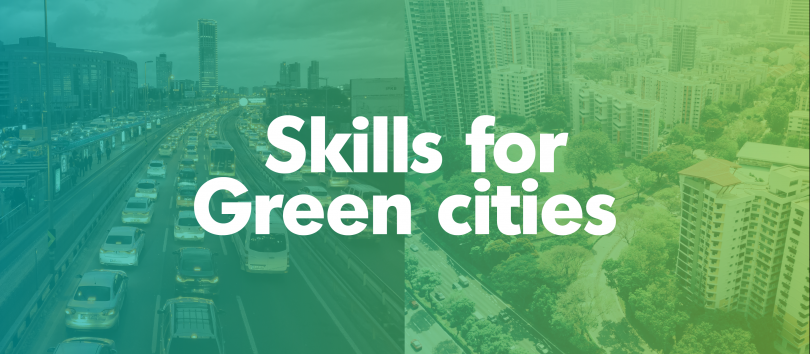
Skills for Green Cities
More than half the world’s population lives in urban areas. With the trend set to continue, how to make cities more environmentally sustainable, and the skills required to make such a transition, was the focus of this Wednesday’s LearningConnect session, which was broadcast live on Facebook, LinkedIn and YouTube.
The webinar was titled “LearningConnects: Skills for Green Cities”. The speakers were Eva Bernard, Principal Advisor, Gender and Green Economy / Climate Action, at the European Bank for Reconstruction and Development (EBRD); Temur Akhmedov, international expert in energy efficiency, Uzbekistan; and Anastasia Fetsi, Specialist in Human Capital Development, ETF.
By 2050, seven out of every 10 people on the planet are expected to live in urban areas, according to United Nations projections. Such burgeoning growth of towns and cities, particularly in Asia and Africa, requires a green transition for urban areas to improve the livelihoods of people and the planet.
This needs urban planners, architects, developers, companies and municipalities to adopt green practices as towns and cities expand. In Europe there is a pressing need for such skills as the EU works towards being the first climate neutral continent by 2050. But in many countries there is a chronic skills gap, with the relevant expertise lacking amid rapid urban growth.
In Uzbekistan, a construction boom over the past several years struggled to keep pace with developments in energy efficiency, such as applying international codes like the USA’s Green Building Council’s LEED certification. “Such buildings require energy efficiency audits, but there are no certified energy auditors in Uzbekistan,” said Akhmedov.
With the country’s planned Presidential University of Uzbekistan to be LEED Platinum certified and a net-zero carbon campus, eco-friendly construction is relying on Turkish engineers. “I wish we had people with Turkish skills sets, but there’s a dramatic shortage of engineers to do a project like that. We are working to train people, and on the behavioural component, as upgrading a building is easy, spending money is easy, but changing human behaviour in a building is difficult,” added Akhmedov.
Changing mindsets is essential for all aspects of cities to be greener, from how buildings are designed and actually used, to how they are heated or cooled, as well as how people move around urban areas.
The EBRD has adopted an inclusive approach in its €2-billion-plus Green Cities programme, set up in 2016, which is operating in 45 cities in Eastern Europe, Central Asia, the Balkans and Northern Africa.
The programme works with municipalities to develop an action plan of priority areas to make the transition. “The areas in which we invest are green buildings, sustainable infrastructure and green transportation, like electric buses,” said Bernard.
Inclusivity is a part of the programme in how such projects are implemented, assessing what vulnerabilities people have, the gender gaps in accessing infrastructure and services, and what skills are needed in education, training and technical areas. “It is to address these needs and also have greener infrastructure,” she said.
In Tblisi, Georgia the EBRD worked with the municipality to acquire buses that run on compressed natural gas (CNG), but also wanted to ensure women would be employed to drive the greener buses. From only one female bus driver in 2016, some 22 women are now trained for the job. “Our green buses have women with the right skills,” said Bernard.
The EBRD aims to involve 100 cities by 2024 in the Green City programme, which is also linked to its just transition initiative launched last year. “It is to ensure that no one is left behind in the transition to a low carbon economy,” said Bernard.
In the former coal mining city of Wałbrzych in Poland, the EBRD is working to re-skill its populace and develop a low-carbon intensive economy. Through the Green Climate Fund, the bank is funding renewable energy projects in Kazakhstan and Egypt that also focuses on developing skills among women, in the renewables sector. “We are working with the government, educational providers and the private sector to make sure there are equal opportunities in the new green economy,” said Bernard.
With countries that perform better in skills development also leading in green technologies, a correlation can be drawn. “The more skills development, the more flexible, adaptable, and innovative they are to the changes in the economy and society. They see how it influences demand for skills, and will try to adapt their occupational standards and training programmes. The more ready they are to identify these changes and respond, the easier it is to become greener,” said Fetsi.
The green transition of cities involves adopting digital technologies, often referred to as the Industrial Revolution 4.0, which involves automation, interconnectivity and smart technology.
The plans for ‘smart’ and ‘green’ cities will require skills to operate the technology but also develop new tech. “Technological innovation will be ongoing for years, and we need people to support and develop skills that go hand-in-hand with (green) sectoral development,” said Fetsi.
“We will have a lot of discussions at our June conference on how cities will help with the green transition,” she added, referring to the ETF’s week-long event on building lifelong learning systems and skills for green and inclusive societies in the digital era.
Noting that the webinar was occurring the day before Earth Day (22 April), Fetsi highlighted the European Green Deal and other EU initiatives to green the cities and towns that more than two-thirds of Europeans live in.
A major initiative has been the European Green Capital Award, based on a city’s environmental record. Launched in 2008, this year’s Green Capital is the Finnish city of Lahti.
“We expect more action from cities to ensure people have the right skills for cities to be smarter and more liveable,” said Fetsi.
Watch the full discussion here: https://fb.watch/52ux-bVFS3/
Did you like this article? If you would like to be notified when new content like this is published, subscribe to receive our email alerts.